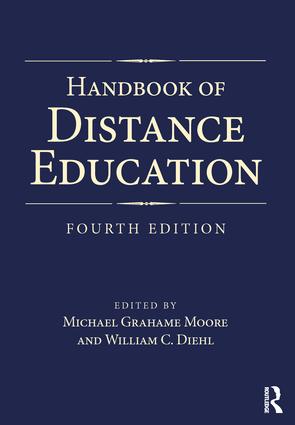
Wondering what’s new — and critical to know — in the field of distance education? The Handbook of Distance Education, Fourth Edition, is a comprehensive collection of current research, established practices and recent changes to implementation, pedagogy and policy. It also addresses future research needs and directions based on present-day information.
Created by thought leaders and practice-based leaders who are also well-versed in bringing quality assurance to the field of distance education, this handbook is a great resource for students, teachers and practitioners who are interested in topics related to online education. Using a systems approach, the handbook is divided into four key sections: historical and theoretical foundations; teaching and learning; management, policy and administration; and audiences and providers. While each chapter can be viewed as a stand-alone treatment of a topic, the entire book allows readers to see the connections that exist among various topics in the field.
As with all other editions, this handbook was conceptualized and edited by Michael G. Moore, a distinguished professor of education at the Pennsylvania State University, who is known for his leadership in the scholarly study of distance education. For this fourth edition, Michael invited Dr. William (Will) Diehl, an assistant professor of education and the coordinator of online graduate programs at Penn State, to join him in updating and editing the handbook. Considering Will’s background as well as his contributions to QM’s research-focused reviews of literature centered around online education, this handbook is a valuable resource for anyone interested or involved in implementing QM Standards and improving the quality of their online education system.
Along with Will, there are three other contributors with ties to QM. Kay Shattuck, Adjunct Assistant Professor at Penn State College of Education, is the QM Director of Research. Her chapter in this handbook covers the topic of teaching online. Then there is Penny Ralston-Berg, Instructional Designer for the Penn State World Campus and QM Instructional Designer Association Chair. Her chapter focuses on active learning strategies for optimal learning. Finally, there’s Julie Porosky Hamlin, Executive Director at MarylandOnline and QM Board Member. Her chapter speaks to assuring quality in distance education — with regard to accreditation, regulation and the standards movement. In addition to these topics, the handbook covers many other important areas, such as the landscape of K–12 online learning, analyses of research on blended learning and implications of the Community of Inquiry framework.
To further understand the value of this handbook, we spoke with Kay Shattuck to get an insider’s perspective on who this book is for and why it was created. “This handbook is a resource for anyone who wants a reliable source of analyses of scholarly and vetted professional literature from leaders in the field,” Kay said.
In preparing for her own chapter update, Kay took recent research into account. “It became evident that the field had moved beyond a narrow research focus on what motivates faculty to teach online. I realized that is now a dated question with the demands for online education…and that motivation was [now] explored around who, when, where, why, and how online teaching was occurring.” Understanding and keeping up with how online education has evolved is crucial to addressing instructional gaps and improving student satisfaction and achievement through a quality assurance system. And that’s what this fourth edition aims to help you do.
The handbook is currently available for purchase through the publisher’s website as well as on Amazon. When purchased through the publisher’s website, QM members will receive a 10% discount*. Just enter code FLR10 during the checkout process.
*Offer cannot be used in conjunction with any other offer or discount and only applies to books purchased directly via the website, www.routledge.com
